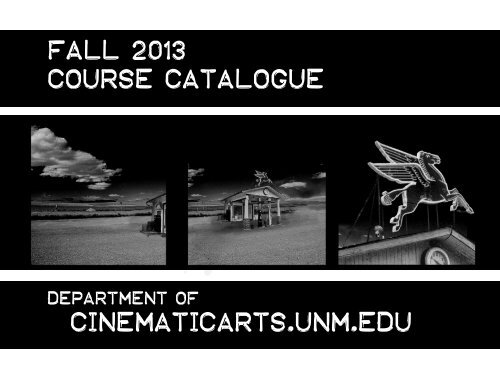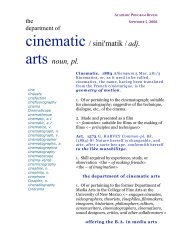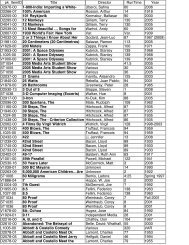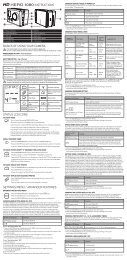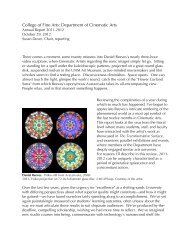Fall Course Catalogue - Department of Cinematic Arts - University of ...
Fall Course Catalogue - Department of Cinematic Arts - University of ...
Fall Course Catalogue - Department of Cinematic Arts - University of ...
You also want an ePaper? Increase the reach of your titles
YUMPU automatically turns print PDFs into web optimized ePapers that Google loves.
<strong>Fall</strong> 2013<br />
<strong>Course</strong> <strong>Catalogue</strong><br />
<strong>Department</strong> <strong>of</strong><br />
<strong>Cinematic</strong><strong>Arts</strong>.unm.edu
FALL 2013 Schedule<br />
Please check course descriptions for any applicable prerequisites or restrictions.<br />
This layout only shows courses housed within the department <strong>of</strong> cinematic arts.<br />
Monday Tuesday Wednesday Thursday Friday Saturday<br />
Digital Post Production Tech Intro Video STILL / MOVING Tech Intro Video EveryDay Art I + II Intro to Film<br />
MA 429.001 MA 111.002 MA 330/430.004 MA 111.002 MA 330/430.001 MA 210.002<br />
1100-1300 0900-1115 1000-1330 0900-1115 II: MA 430.002 1000-1330<br />
CERIA 365 CERIA 365 CERIA 365 CERIA 365 1130-1800 CTRART 2018<br />
CERIA 365<br />
Tech Intro Video Film Theory: Filmic Essay Tech Intro Video Final Cut Pro Workshop Chicano-Mexican<br />
MA 111.003 MA 331/431.001 MA 111.003 MA 429.006/007 Car Culture MA 330/430.003<br />
1400-1615 1330 - 1700 1400-1615 1500-1700 MA 330.008/430.006 1100-1430<br />
CERIA 365 CERIA 365 CERIA 365 CERIA 365 1330-1700 CERIA 337<br />
CERIA 337<br />
Cinema <strong>of</strong> C Chaplin Intro to Film History <strong>of</strong> Film I Int'l Horror<br />
MA 330.002/430.008 MA 210.001 MA 326/426.002 MA 335/435<br />
1730-2100 1730-2100 1730-2100 1730-2100<br />
CTRART 2018 CTRART 2018 CTRART 2018 CTRART 2018<br />
Art <strong>of</strong> Collage Intro Video Art Prod Intro Video Art Prod 16mm Filmmaking<br />
MA 429.002 MA 216.002 MA 216.001 MA 391.000<br />
1730-2100 1730-2100 1730-2100 1730-2100<br />
CERIA 365 CERIA 365 CERIA 365 CERIA 365<br />
Beyond Hollywood Intro to Screenwriting Current Trends Advanced Screenwriting<br />
MA 212.003 MA 324.003 MA 330.007/430.005 MA 390.001<br />
1730-2100 1800-2100 1730-2100 1700-2000<br />
CERIA 337 CERIA 337 CERIA 337 CERIA 337<br />
Tech Intro Video Tech Intro Video<br />
MA 111.004 MA 111.004<br />
1800-2015 1800-2015<br />
Woodward 138 Woodward 138
COURSES HOUSED IN OTHER DEPARTMENTS<br />
CREATING CHANGE<br />
MA 429.001 OR 429.002<br />
Szu-Han Ho, Catherine Harries, Andrea Polli + Molly Sturges<br />
Offered through Art + Art History <strong>Department</strong> with Music +<br />
Theater<br />
Saturdays, 11:00 a.m. – 4:00 pm + Arranged (3 credit hours)<br />
ART 350, Special Fee $98.<br />
COLLABORATION AND<br />
PARTICIPATION<br />
MA 429<br />
Molly Sturges<br />
Offered through Art + Art History<br />
Fridays 1:00pm – 4:00pm<br />
Special Fee $98.<br />
FRENCH CINEMA<br />
MA 330.009/430.007<br />
W. Putnam<br />
Offered through Foreign Languages<br />
Wednesdays 4:00pm – 6:45pm<br />
Special Fee $63.<br />
RUSSIAN CULTURE + FILM<br />
MA 339.001<br />
Natalia Rud<br />
Offered through Foreign Languages<br />
Tuesdays + Thursdays 2:00pm – 3:15pm<br />
Special Fee $63.<br />
SOCIAL TRANSFORMATION + FILM<br />
MA 330<br />
Teresa Cutler-Broyles<br />
Offered through Peace Studies<br />
SOMETIME 2:00pm – 3:15pm<br />
Special Fee $63.<br />
SOCIAL PROBLEMS + FILM<br />
MA 330.006<br />
Tamara Key<br />
Offered through Sociology<br />
Tuesdays + Thursdays 2:00pm – 4:30pm<br />
Special Fee $63.<br />
CHICANO/A CULTURE<br />
MA 330.005<br />
Jesse Aleman<br />
Offered through English<br />
Wednesdays 4:00pm – 6:30pm<br />
Special Fee $63.
CINEMATIC ARTS GENERAL INFO<br />
MAIN OFFICE:<br />
TO CONTACT: 277-6262, or CINEMA@UNM.EDU<br />
HOURS: Monday – Friday 8am – 5pm<br />
ADDRESS:<br />
LOCATION:<br />
CERIA Bldg. 83, Room 370 MSC04 2570;<br />
1 <strong>University</strong> <strong>of</strong> New Mexico;<br />
Albuquerque, New Mexico 87131-0001<br />
CERIA is north <strong>of</strong> Art & Art History and east <strong>of</strong> Northrop Hall by the lily fountain.<br />
We are on the third floor, and you’ll find the <strong>of</strong>fice to your right <strong>of</strong> the elevator in room 370.<br />
ACADEMIC ADVISEMENT:<br />
DEPARTMENT: Dr. James Stone. 277-9469, or JSTONE@UNM.EDU<br />
COLLEGE: CFA Main Office: 277-481, or visit them online: FINEARTS.UNM.EDU<br />
EQUIPMENT + PRODUCTION:<br />
Technical Coordinator James Roy 277-5069 JASROY@UNM.EDU<br />
CAGE Manager Scott Rancher 277-1171 MACAGE@UNM.EDU<br />
NOTE TO MEDIA ARTS MAJORS:<br />
Some courses described in the following pages bear two numbers (a 300- and a 400- number). When you enroll in such<br />
classes, please register for the number listed under <strong>Cinematic</strong> <strong>Arts</strong> “Major Study Requirements” in the UNM catalogue.<br />
Consult the same page and the following one for a general update on course numbers in <strong>Cinematic</strong> <strong>Arts</strong>. If you have<br />
questions as you register, please contact the <strong>Cinematic</strong> <strong>Arts</strong> Office at 277-6262.<br />
NOTE TO UNM GRADUATE STUDENTS:<br />
A course with an asterisk before its numeral, such as M A *430, is available for graduate credit to students enrolled in<br />
graduate programs; graduate-level work will be expected. It is important to have your home department pre-approve any<br />
coursework taken for graduate credit at this level.<br />
2
INTRO TO FILM STUDIES<br />
MA 210.001 (CRN 11974)<br />
TERESA CUTLER-BROYLES<br />
Tuesdays, 5:30-9:00 p.m.<br />
CA 2018, Special Fee $63.<br />
MA 210.002 (CRN 46000)<br />
BECKY PETERSON<br />
Saturdays, 10:00a.m. – 1:30p.m.<br />
CA 2018, Special Fee $63.<br />
An overview <strong>of</strong> a century <strong>of</strong> film history and study, this course will<br />
feature a broad range <strong>of</strong> film types (narrative, experimental,<br />
documentary), as well as a range <strong>of</strong> approaches to understanding<br />
HISTORY, CRITICISM, THEORY COURSES<br />
the aesthetic and cultural significance <strong>of</strong> the medium. “INTRODUCTION<br />
TO FILM” IS A REQUIRED COURSE FOR CINEMATIC ARTS MAJORS AND<br />
MINORS; it is also a prerequisite to production courses at the 200-<br />
level and above, and to courses in history, criticism, and theory at<br />
the 300-level and above.<br />
BEYOND HOLLYWOOD: CINEMA OF<br />
EXILE AND DIASPORA<br />
MA 212.003 (CRN 42335)<br />
CAROLINE HINKLEY<br />
Mondays, 5:30-9:00 p.m.<br />
CERIA 337, Special Fee $63.<br />
This course examines the filmmaking <strong>of</strong> postcolonial, Third World,<br />
and other displaced subjects living in the West. We explore many <strong>of</strong><br />
the shared themes, metaphors, and symbols <strong>of</strong> these films, among<br />
those alienation, displacement, journeying, nomadism, borders,<br />
migrancy, homelessness, nostalgia, and home-seeking. We also<br />
examine and discuss certain styles that characterize these films,<br />
many <strong>of</strong> them demonstrating fragmented, multilingual, epistolary,<br />
interstitial, and self-reflexive characteristics. In most <strong>of</strong> these films,<br />
identity is not fixed but is represented as a process <strong>of</strong> becoming and<br />
transformation. “BEYOND HOLLYWOOD” IS A REQUIRED COURSE FOR<br />
MAJORS.<br />
PREREQUISITE: MA 210 OR PERMISSION OF INSTRUCTOR.<br />
HISTORY OF FILM I: SILENT ERA<br />
MA 326/*426.002 (CRN 35746 and 35747)<br />
JAMES STONE<br />
Wednesdays, 5:30–9:00 p.m.<br />
CA 2018, Special Fee $63;<br />
A study <strong>of</strong> major fiction, documentary, and experimental films from<br />
around the world in relation to prominent artistic, social, and political<br />
concerns <strong>of</strong> the silent era (approximately 1890 -1930). Films from the<br />
US, France, England, Germany, the former USSR, and Japan are<br />
included in this historical survey.<br />
“HISTORY OF FILM” IS A REQUIRED COURSE FOR MAJORS.<br />
PREREQUISITE: MA 210 OR PERMISSION OF INSTRUCTOR.<br />
3
EVERYDAY ART<br />
MA 330/430.001 (CRN 44126 and 44127)<br />
Cross-listed with RELG 347.005 (CRN 44495)<br />
+ PCST 340.002 (CRN 47632)<br />
SUSAN DEVER + CAROLINE HINKLEY<br />
Fridays + 2 Saturdays, 11:30-6:00 p.m.<br />
Ceria 365, Special Fee $63.<br />
DATES: AUG 23, 24 + 31; SEPT 6 + 20, OCT 4 + 18, NOV 1, 15, 22<br />
+ 23<br />
EVERYDAY ART II<br />
MA 430.002 (CRN 44128)<br />
Everyday, adjective. Ordinary, routine, common . . . brilliantly what is<br />
Every day, adverb. Daily, habitually, steadfastly . . . with much<br />
delight in discipline<br />
EveryDay Art, an adjectival noun adverb (or some such thing, surely).<br />
e.g., a good cup <strong>of</strong> tea made mindfully each morning;<br />
a symphony composed on paper napkins<br />
This is a course about cultivating art-making as a daily habit, a way<br />
<strong>of</strong> seeing, being, taking in, and responding to our world. With<br />
Tibetan Buddhist artist Chögyam Trungpa’s True Perception, plus<br />
the work <strong>of</strong> other Buddhist arts exemplars, accompanied by a range<br />
<strong>of</strong> pr<strong>of</strong>oundly moving moving-images, we’ll practice the techniques<br />
<strong>of</strong> mindfulness-awareness meditation, quieting our minds so that<br />
insight has means, method, and opportunity to arise. Off the<br />
cushion and away from our theater seats, we’ll visit sacred and<br />
secular sites (an all-faith exploration, from sports arenas to<br />
churches) to help us further experience elements that constitute the<br />
seeds <strong>of</strong> our in(ter)dependent studies. Individual or group projects<br />
may range from screenplays, critical essays, photography portfolios,<br />
scholarly investigations, cinematic novellas, scientific projects, to<br />
other quotidian and other evanescent pleasures.<br />
CHICANO/MEXICAN FILM AND<br />
LITERATURE<br />
MA 330/430.003 (CRN 36896 and 38228)<br />
STEPHANIE BECKER<br />
Saturdays, 11:00 - 2:30 p.m.<br />
Ceria 337, Special Fee $63.<br />
This course will examine the intersections between cinema and<br />
cinematic prose from and about Mexico and the US Latino<br />
Southwest. We will read classics and newly released excerpts from<br />
Chicano/as and explore the complex world <strong>of</strong> family, identity,<br />
gender, and border politics as we watch films from both sides <strong>of</strong> the<br />
border. For more information about our studies, or to learn why the<br />
popular Chicana novelist Denise Chávez loves Mexican movie idol<br />
Pedro Infante, simply sign up.<br />
STILL / MOVING<br />
MA 330/*430.004 (CRN 39353 and 36949)<br />
CAROLINE HINKLEY<br />
Wednesdays, 10:00a.m. – 1:30p.m.<br />
Ceria 365, Special Fee $63.<br />
This course will examine films and texts by filmmakers,<br />
photographers, critics, and historians who address encounters,<br />
intersections, and collisions <strong>of</strong> the still and moving image. There is<br />
an emergent dialogue occurring across disciplines particularly with<br />
film studies scholars, artists and interdisciplinary practitioners who<br />
find these cinema and photo-based migrations and mutations critical<br />
in the formation <strong>of</strong> post-modern film studies. In this class we will<br />
examine installations and exhibitions <strong>of</strong> artists who not only expose<br />
an audience to the intersections <strong>of</strong> the moving and still image, but<br />
expose cinema and photography to each other in a single work.<br />
Among others we will view films by Chris Marker, Patrick Keilor,<br />
Atom Egoyan, Rebecca Baron, Nancy Davenport who combine<br />
video, digital, and photographic formats to produce and blur<br />
traditional cinematic boundaries.<br />
4
CINEMA OF CHARLIE CHAPLIN<br />
MA 330.002/*430.008 (CRN 43366 and 43368)<br />
JAMES STONE<br />
Mondays, 5:30 - 9:00 p.m.<br />
CA 2018, Special Fee $63.<br />
Charlie Chaplin was a comic genius. Celebrated the world over, his<br />
“Little Tramp” remains an instantly recognizable cinematic icon.<br />
Chaplin’s art was intimately related to his life and times. Each week<br />
we will screen and discuss his most important (and funniest!) works,<br />
making sure to place them within a biographical and historical<br />
context. His life was extraordinarily dramatic. Born into a family<br />
wracked by poverty, mental illness, and alcoholism he grew up to<br />
be, perhaps, the most famous person in the world. Acclaimed for his<br />
unsurpassed skills as a physical comedian, he was also persecuted<br />
by anti-Communist forces, hounded by a scandal-hungry press, and<br />
driven out <strong>of</strong> the United States for his political beliefs. His cinema<br />
moves seamlessly between moments <strong>of</strong> frenetic slapstick, sublime<br />
choreography, life-and-death struggle, passionate courtship, and<br />
heartbreaking loss. Chaplin made art that runs the gamut <strong>of</strong> human<br />
experience.<br />
CURRENT TRENDS IN MOVING<br />
IMAGE ART<br />
MA 330.007/*430.005 (CRN 46722 and 46723)<br />
BRYAN KONEFSKY<br />
Wednesdays, 5:30pm – 9:00pm<br />
CERIA 337, Special Fee $63.<br />
Moving image art represent pr<strong>of</strong>ound artifacts <strong>of</strong> human activity that<br />
are both expressions <strong>of</strong> radical imagination and barometers <strong>of</strong> the<br />
human condition. This course will survey a wide range <strong>of</strong> undependent<br />
media focusing on artistic practice in the context <strong>of</strong><br />
historic, cultural and political concerns. The various histories <strong>of</strong><br />
moving image art raise important issues concerning the limits and<br />
possibilities <strong>of</strong> what a movie might be. The politics <strong>of</strong> voice,<br />
representation, and cultural ownership are central concepts that we<br />
will explore. The course will consist <strong>of</strong> screenings, readings,<br />
discussions, and lectures. Students will be evaluated through<br />
written assignments, exams, and class participation.<br />
PREREQUISITE: MA 210 or permission <strong>of</strong> instructor.<br />
I DRIVE, THEREFORE I AM: CAR<br />
CULTURE AND THE SPEED OF LIGHT<br />
MA 330.008/*430.006 (CRN 46724 and 46725)<br />
BRYAN KONEFSKY<br />
Fridays, 1:30pm – 5:00pm<br />
CERIA 337, Special Fee $63.<br />
“I think that cars today are almost the exact equivalent <strong>of</strong> the great<br />
Gothic cathedrals. (They are) the supreme creation <strong>of</strong> an era,<br />
conceived with passion…and consumed in image if not in usage by<br />
a whole population which appropriates them as a purely magical<br />
object.” – Roland Barthes, Paris, 1957.<br />
From flat heads to big blocks, the Model T to Ford’s Super Duty, the<br />
automobile has played an important role in the history <strong>of</strong> cinema<br />
and, as Roland Barthes suggests, shaping our cultural sense <strong>of</strong> self.<br />
This course will explore, study, deconstruct, and “unpack” a<br />
selection <strong>of</strong> cinematic incarnations <strong>of</strong> the automobile as both<br />
magical object and cultural icon. MA 330/430 will consist <strong>of</strong><br />
screenings, readings, discussions, lectures and a field trip to the<br />
Albuquerque Dragway. Students will be evaluated through written<br />
assignments, exams, and class participation.<br />
5
FILM THEORY: THE FILMIC ESSAY<br />
MA 331/431-001 (CRN 38969 and 38970)<br />
CAROLINE HINKLEY + NINA FONOROFF<br />
Tuesdays, 1:30 – 5:00 p.m.<br />
Ceria 365, Special Fee $63;<br />
Students will explore major concepts in film theory and criticism<br />
through comparative analysis <strong>of</strong> critical essays and films <strong>of</strong> diverse<br />
styles. We will read and discuss the ideas <strong>of</strong> historical and<br />
contemporary theorists as they pertain to a variety <strong>of</strong> films screened<br />
in class. Themes will include cinematic realism, montage editing, the<br />
development <strong>of</strong> narrative, documentary, new media, animation,<br />
gaming, and avant-garde theories and practices in cinema; plus<br />
psychoanalytic, feminist, queer, phenomenological, and multicultural<br />
readings <strong>of</strong> films. What defines cinema as a unique art form? What<br />
elements connect films with our notions <strong>of</strong> reality? How do<br />
ideologies come to be inscribed in films? How does film resemble a<br />
language? These are among the questions that we will address.<br />
This course will provide the background for further studies in media<br />
history/theory, film and video making, and cultural studies.<br />
“Film Theory” is a required course for majors.<br />
Prerequisite: MA 210 or permission <strong>of</strong> instructor.<br />
INTERNATIONAL HORROR<br />
MA 335/*435.001 (CRN 46726 and 46727)<br />
JAMES STONE<br />
Thursdays, 5:30 - 9:00 p.m.<br />
CA 2018, Special Fee $63;<br />
A survey <strong>of</strong> the horror film genre from its origins in silent films<br />
through its contemporary instances, this course asks what it is that<br />
horror, as a genre, studies. Among monsters <strong>of</strong> various kinds,<br />
fabulous distortions <strong>of</strong> the human, what fundamental aspects <strong>of</strong><br />
human existence and culture are revealed? What do we learn about<br />
dreams, suspense, fear, and fantasy? What is it about us that<br />
delights in being horrified?<br />
PREREQUISITE: MA 210 OR PERMISSION OF INSTRUCTOR.<br />
6
TECHNICAL INTRO TO VIDEO<br />
MA 111.002 (CRN 11972)<br />
JAMES ROY<br />
Tuesdays & Thursdays, 9:00am – 11:15am<br />
CERIA 365, Special Fee $88.<br />
MA 111.003 (CRN 33109)<br />
JESSIE LENDERMAN<br />
Mondays & Wednesdays, 2:00pm – 4:15pm<br />
CERIA 365, Special Fee $88.<br />
MA 111.004 (CRN 35226)<br />
MICHAEL KAMINS<br />
Tuesdays & Thursdays, 6:00pm – 8:15pm<br />
WOOD 138, Special Fee $88.<br />
Through a hands-on approach, you’ll learn the technical and<br />
operational foundations <strong>of</strong> video production equipment and<br />
procedures, becoming knowledgeable about the responsibilities and<br />
techniques <strong>of</strong> individual production. This studio course will take you<br />
through the phases <strong>of</strong> production from pre- through postproduction.<br />
You’ll gain awareness <strong>of</strong> the creative potential <strong>of</strong> motion<br />
pictures (including video and film) as art. Focusing on narrative and<br />
non-narrative vocabularies, we will explore the art <strong>of</strong> moving images<br />
as you develop your own work with in-class critiques, exercises, and<br />
projects. This course is a prerequisite for further courses in<br />
production.<br />
STUDIO COURSES<br />
INTRO TO MOVING IMAGE ART<br />
PRODUCTION<br />
MA 216.002 (CRN 29516)<br />
BRYAN KONEFSKY<br />
Tuesdays, 5:30 - 9:00 p.m.<br />
CERIA 365, Special Fee $123,<br />
MA 216.001 (CRN 46729)<br />
DEBORAH FORT<br />
Wednesdays, 5:30 - 9:00 p.m.<br />
CERIA 365, Special Fee $123,<br />
According to artist Jean Cocteau, “film and video will only become a<br />
true art form when their tools are as inexpensive as pencil and<br />
paper.” The low cost <strong>of</strong> new digital equipment suggests that only<br />
now—eighty years after his prophetic statement—are we beginning<br />
to realize Cocteau’s dream. This introductory course will be<br />
structured as a creative laboratory where students will explore a<br />
variety <strong>of</strong> aesthetic and theoretical issues relating to new media<br />
technology and the creative process. Students will learn basic digital<br />
production and post-production skills through a range <strong>of</strong><br />
collaborative and individual projects and exercises.<br />
PREREQUISITE: M A 111 AND 210 OR PERMISSION OF<br />
INSTRUCTOR.<br />
7
INTRODUCTION TO SCREENWRITING<br />
MA 324.003 (CRN 12169)<br />
(Cross-listed THEA 458.003 + ENGL 324.003)<br />
MATTHEW MCDUFFIE<br />
Tuesdays, 6:00pm – 9:00pm<br />
CERIA 337, Special Fee $63;<br />
An in-depth workshop on the basics <strong>of</strong> character, structure, scenes,<br />
dialogue, conflict, visualization, and good old story telling as it<br />
applies to the screenplay format. Open to variations (including<br />
Television, Graphic Novels, Documentary). We’ll read scenes from<br />
scripts, watch film clips, and write at least forty pages <strong>of</strong> an original<br />
screenplay.<br />
PREREQUISITE: ENG 224 OR PERMISSION OF INSTRUCTOR.<br />
ADVANCED SCREENWRITING<br />
MA 390.001 (CRN 30600)<br />
(Cross-listed with THEA 458.001 / 558.001 + ENGL 424.001)<br />
MATTHEW MCDUFFIE<br />
Thursdays, 5:00pm – 8:00pm<br />
CERIA 337, Special Fee $63;<br />
This is a continuation <strong>of</strong> the introductory course. Emphasis will be on<br />
developing story ideas, dramatic conflict, sequencing, and scene<br />
work. Intense workshops will lead to a completed 120-page<br />
screenplay.<br />
PREREQUISITE: MA 324 OR PERMISSION OF INSTRUCTOR.<br />
16MM FILMMAKING<br />
MA 391-001 (CRN 41578)<br />
Nina Fonor<strong>of</strong>f<br />
Thursdays, 5:30pm – 9:00pm<br />
CERIA 365, Special Fee $148;<br />
This course introduces basic 16mm filmmaking techniques, with an<br />
emphasis on film as a creative art form. Students will be introduced<br />
to pre-production planning through the final edit, and will become<br />
familiar with both the practical and aesthetic challenges <strong>of</strong> making<br />
short films. Class sessions will include critiques <strong>of</strong> student work,<br />
technical demonstrations, screening <strong>of</strong> short films made by a variety<br />
<strong>of</strong> artists, and the planning and execution <strong>of</strong> a class project. Among<br />
the topics that are covered in the class are camerawork, lighting, film<br />
stocks and exposure, sound recording, editing techniques, and<br />
preparing the film for the lab. Students will be responsible for<br />
purchasing the majority <strong>of</strong> their own materials for the course; 16mm<br />
production costs usually run approximately $500 to $600 for the<br />
semester.<br />
Prerequisite: Permission <strong>of</strong> instructor.<br />
8
DIGITAL POST PRODUCTION: Hybrid<br />
<strong>Course</strong><br />
MA 429.001 (CRN 39362)<br />
DEBORAH FORT<br />
Mondays, 11:00am – 1:00pm AND ONLINE<br />
CERIA 365, Special Fee $98,<br />
Digital Post Production is designed to facilitate the expansion <strong>of</strong> the<br />
student’s awareness <strong>of</strong> the editing process, and to develop skills as<br />
an editor. We will explore a wide range <strong>of</strong> films in order to better<br />
understand what makes them work in terms <strong>of</strong> editing. Students will<br />
also develop a level <strong>of</strong> competence with the tools necessary to<br />
effectively practice the art <strong>of</strong> the editor. There are numerous<br />
programs being used by pr<strong>of</strong>essional editors today. We will be<br />
working with Final Cut X, Adobe Premiere, and Avid Media<br />
Composer as our primary editing platforms. We will also be using<br />
Adobe After Effects for compositing, and animation, Speed Grade<br />
for color correction, Squeeze and Adobe Media Encoder for<br />
compression and Adobe Encore for final DVD compilation. We will<br />
use Adobe Photoshop (or Gimp) for developing graphic elements,<br />
and prepping materials for use in After Effects. The essentials <strong>of</strong><br />
visual aesthetics, editing theory and post-production management<br />
will be addressed with all projects. Students will apply their skills in a<br />
variety <strong>of</strong> exercises and projects. This is a hybrid class, which means<br />
that half <strong>of</strong> the class is online and half <strong>of</strong> it is face to face. There are<br />
no specific class prerequisites for this class, though students will<br />
need a basic understanding <strong>of</strong> editing on both the technical and<br />
theoretical levels, and have the independence and maturity<br />
necessary for success in an online or hybrid class.<br />
RESTRICTED: PERMISSION OF INSTRUCTOR<br />
ART OF COLLAGE<br />
MA 429.002 (CRN 43418)<br />
NINA FONOROFF<br />
Mondays, 5:30pm – 9:00pm<br />
CERIA 365, Special Fee $98,<br />
The rich history <strong>of</strong> collage, assemblage, and bricolage in twentiethcentury<br />
artmaking provides the backdrop <strong>of</strong> this studio practice<br />
course, as we explore exciting uses <strong>of</strong> “found” materials across<br />
several different media: paper, film, video, and sound. Students will<br />
work with film leaders, found footage, audio from varied sources—<br />
and, <strong>of</strong> course, good old-fashioned paper, scissors and glue—to<br />
produce a portfolio <strong>of</strong> small-scale work. Creating still images from<br />
moving-image work, and translating sequential still images into video<br />
are among the methods students may investigate. The course is<br />
well-suited to both beginning and advanced students who wish to<br />
expand the range <strong>of</strong> media they can use creatively, and who are<br />
interested in learning some basic techniques <strong>of</strong> digital manipulation<br />
using Final Cut Pro, Soundtrack Pro, and Photoshop. When time<br />
permits, we will also look at—and listen to—work by visual artists,<br />
filmmakers, and sound artists who have created resonant work with<br />
a collage sensibility.<br />
RESTRICTED: PERMISSION OF INSTRUCTOR<br />
FINAL CUT PRO WORKSHOP<br />
(TWO 8-WEEK SESSIONS, 1 CREDIT EACH)<br />
MA 429.006 from August 20 to October 15, 2011 (CRN 32504)<br />
MA 429.007 from October 15 to Dec 7, 2011 (CRN 32505)<br />
DANIEL GALASSINI<br />
Thursdays, 3:00pm – 5:00pm<br />
CERIA 365, Special Fee $98.<br />
This one-credit workshop will introduce students to basic techniques<br />
<strong>of</strong> video editing in Final Cut Pro s<strong>of</strong>tware for the Macintosh.<br />
Instruction will include logging and capturing <strong>of</strong> video clips, file<br />
management on Firewire hard drives, arranging video and audio<br />
clips on the timeline, video and audio transitions, and advanced<br />
editing techniques. This course is highly recommended for students<br />
enrolled in <strong>Cinematic</strong> <strong>Arts</strong> studio courses under the MA 216 number.<br />
9
Dr. Stephanie Becker, who earned her doctorate from UNM’s<br />
<strong>Department</strong> <strong>of</strong> Spanish and Portuguese while serving as a<br />
<strong>Cinematic</strong> <strong>Arts</strong> TA, became an Adjunct Lecturer, uniting<br />
research and writing in Mexican/US Latino Studies to create<br />
our newest version <strong>of</strong> “Latin American Film” and Spain’s<br />
“Films <strong>of</strong> Almodovar.” She has extended her studies to include<br />
comparative analysis <strong>of</strong> gender construction and performance<br />
in Chicano film and literature. She is currently working on a<br />
comparative project in which she explores how the 'political is<br />
personal' in which family dysfunction mirrors political upheaval<br />
in films from Chile, Mexico, and Argentina. To contact, please<br />
email SBECKER@UNM.EDU<br />
Teresa Cutler-Broyles has a Master's Degree in Cultural<br />
Studies and Comparative Literature and is a Ph.D. candidate<br />
in American Studies with a focus on representation, popular<br />
culture, film and performance. She hosts writing workshops<br />
to Italy through InkWell International LLC, and teaches<br />
courses such as Cult Film, Middle Eastern Film, Social<br />
Transformation through Film, and Monsters in Film. Writing<br />
pr<strong>of</strong>essionally since 1992, her work includes short fiction and<br />
novels, non-fiction, travel essays, book reviews, and pr<strong>of</strong>iles.<br />
To contact, please email TERESA_CUTLER@COMCAST.NET<br />
The subjects <strong>of</strong> Dr. Susan Dever’s sabbatical scholarship and<br />
practice—Eastern philosophy and film art—continue to inform<br />
a series <strong>of</strong> new <strong>Cinematic</strong> <strong>Arts</strong> courses in Contemplative<br />
Cinema and Visual Epistemologies. The ever-changing<br />
“EveryDay Art: Mindfulness for Moviemakers and Other<br />
Poets,” plus all the different iterations <strong>of</strong> “Celluloid Buddhas,”<br />
have garnered high marks from “group/independent study”<br />
students discovering, through the combined practice <strong>of</strong><br />
secular sitting meditation and interdependent cinematic artmaking<br />
<strong>of</strong> all sorts, what it means to be an artist. Contact at<br />
SUSANDEV@UNM.EDU<br />
FALL 2013 FACULTY<br />
Associate Pr<strong>of</strong>essor Nina Fonor<strong>of</strong>f’s hybrids <strong>of</strong> collage,<br />
painting, and musical composition from sampled sound and<br />
cinema have recently resulted in new variations <strong>of</strong> her wellreceived<br />
courses. Central to her creative process is a deep<br />
involvement in almost all <strong>of</strong> the phases <strong>of</strong> a film’s<br />
production—from scripting and shooting to editing and<br />
finishing <strong>of</strong> image and sound elements—enriching our<br />
students’ vision and skill. Most recently, Fonor<strong>of</strong>f has begun<br />
experimenting with hand-processing film. To contact, please<br />
email at NFONOROFF@AOL.COM<br />
The newest member <strong>of</strong> the full time faculty, Associate<br />
Pr<strong>of</strong>essor Deborah Fort, is a Digital Media Artist working with<br />
live image synthesis, using Max/MSP/Jitter. Her experiments<br />
have culminated in several interactive, real-time video projects<br />
using a rock band drum set, among other toys and gadgets.<br />
Uniting filmmakers, dancers, composers, and other artists in<br />
her interactive, feature length documentaries and performance<br />
pieces, Fort is now transferring endless creative skills to<br />
teaching her current students in the new-for-us “Advanced<br />
Editing” and documentary film courses To contact, please<br />
email at DEBFILMS@UNM.EDU<br />
Daniel Gallassini originally wanted to be an architect, but<br />
realized that somebody makes the movies, so why not do<br />
that. In his 25 year career he has done special effects for<br />
various features, TV programs and commercials. He has been<br />
the Post Production Engineer at Loyola Marymount <strong>University</strong><br />
in LA and the Theater Engineer for the Dynatheater at the New<br />
Mexico Museum <strong>of</strong> Natural History. He is currently on faculty<br />
at UNM and Trinity Southwest <strong>University</strong>. He is the staff<br />
cinematographer for the Tall el-Hammam Excavation Project,<br />
an archaeological project in Jordan, producing on a<br />
documentary on the dig. Dan is a fourth generation New<br />
Mexican and doesn’t know why anyone would live (or film)
anywhere else. To contact, please email at<br />
DGALASSINI@UNM.EDU<br />
Visiting Pr<strong>of</strong>essor Caroline Hinkley (MFA, California Institute <strong>of</strong><br />
the <strong>Arts</strong>; MFA Claremont Graduate School) is an<br />
internationally-regarded artist/scholar whose teaching and<br />
expositions encompass film theory, motion and still<br />
photography (digital and conventional), immersive spaces<br />
(including museums, sacred spaces, and the "elsewhere" <strong>of</strong><br />
exile). Caroline has been the recipient <strong>of</strong> a WESTAF/NEA, the<br />
Phelan Award for excellence in Photography from the San<br />
Francisco Foundation. Associate Pr<strong>of</strong>essor Hinkley has<br />
recently received grants from the Icelandic Visual <strong>Arts</strong><br />
Association, Cill Rialaig in County Kerry, Ireland linking her<br />
current photographic art with on-going explorations <strong>of</strong> the<br />
Himalayas. In 2011 Caroline was part <strong>of</strong> a collaborative<br />
exhibition <strong>of</strong> Irish and American artists at the Lesley Heller<br />
Workspace in NYC. Please contact at CINEH@UNM.EDU<br />
Lecturer Bryan Konefsky is a self-taught media maker and<br />
self-described counter-culture worker. He is the director <strong>of</strong><br />
Experiments in Cinema film festival and the president <strong>of</strong><br />
Basement Films. Additionally, he serves on the board <strong>of</strong><br />
advisors for the Ann Arbor Film Festival. Konefsky’s creative<br />
work has received numerous awards including grants from the<br />
National Endowment for the <strong>Arts</strong>, The Banff Centre for the<br />
<strong>Arts</strong>, The New Mexico Film Office, and the Trust for Mutual<br />
Understanding. Additionally, Konefsky has lectured<br />
internationally at venues such as The Bienal de la Imagen en<br />
Movimiento in Buenos Aires, The Smolny Institute in St.<br />
Petersburg Russia, The Directors Lounge in Berlin Germany,<br />
Dongguk <strong>University</strong> in South Korea, and Anthology Film<br />
Archive in New York City. To contact, please email at<br />
BRYANK@UNM.EDU<br />
Jessie Lenderman has worked as a documentarian, film editor<br />
and educator in New Mexico and New York in a variety <strong>of</strong><br />
settings and with diverse clients. She also works as a personal<br />
biographer, has a background in music and has worked as an<br />
art curator and administratot with local non-pr<strong>of</strong>it<br />
organizations. She holds degrees in Education and filmmaking<br />
from Eugene Lang Collage at the New School for Social<br />
Research and from the College <strong>of</strong> Santa Fe. To contact,<br />
please email at JLENDERMAN@UNM.EDU<br />
Snow Balls, Pr<strong>of</strong>essor <strong>of</strong> Practice Matt McDuffie’s new work,<br />
will be produced by its writer and shot in New Mexico. His<br />
students will now have even greater insight into the workings<br />
<strong>of</strong> the pr<strong>of</strong>essional film world. To contact, please email at<br />
BUZZBLANCO@COMCAST.NET<br />
Treating his students to new experiments in the sonic world,<br />
Adjunct Instructor James Roy collaborated with CFA’s Master<br />
<strong>of</strong> Sound, Manny Rettinger, to produce four concerts in the<br />
Electric Ensemble’s “Live at the ARTS Lab” series. This<br />
semester-long project brought renowned local and national<br />
talent to UNM, where artists’ performances were recorded to<br />
CD and video-taped to DVD for distribution. To contact,<br />
please email at JASROY@UNM.EDU<br />
Assistant Pr<strong>of</strong>essor Dr. James Stone’s British Film Institute<br />
research in London led to his presenting a paper at a<br />
conference in the Netherlands on the cinema <strong>of</strong> Michael<br />
Powell, soon to be published by the <strong>University</strong> <strong>of</strong> Groningen.<br />
Another article, “Enjoying 9/11: The Pleasures <strong>of</strong> Cloverfield,”<br />
was accepted for publication by Duke <strong>University</strong>’s Radical<br />
History Review, paving the way for a new iteration <strong>of</strong> CA’s<br />
“Science Fiction.” To contact, please email JSTONE@UNM.EDU<br />
11


